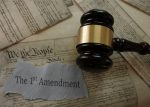Dear Friends,
The Interfaith Peace Project is offering eleven days of reflections for your consideration during the eleven days leading up to The International Day of Peace, September 21st. The theme for this year’s International Day of Peace celebrates the 70th anniversary of the Universal Declaration of Human Rights: “The Right to Peace – The Universal Declaration of Human Rights at 70.” (Please see Thomas P. Bonacci’s letter of September 11, 2018.)
In our reflections, we bring together the wisdom of The Declaration of Human Rights, The Declaration of Independence and the United States Constitution. In today’s refection, we consider Article 2 of The Universal Declaration of Human Rights.As you prepare to observe The International Day of Peace, please consider these reflections. May they inspire and challenge you to be the peace you seek.
The Interfaith Peace Project
+++
Universal Declaration of Human Rights|
Dignity and Justice for all Humanity
Article 2
Everyone is entitled to all
the rights and freedoms
set forth in this Declaration
without distinction of any kind,
such as race, colour, sex, language,
religion, political or other opinion, national
or social origin, property, birth or other status.
Furthermore, no distinction shall be made on the basis of
the political, jurisdictional or international status of the country
or territory to which a person belongs, whether it be independent,
trust, non-self-governing or under any other limitation of sovereignty.
+++
The United States Constitution
Bill of Rights
Amendments

© zimmytws stock.adobe.com
Amendment 1
Amendment XIV, Section 1.
All persons born or naturalized in the United States, and subject to the jurisdiction thereof, are citizens of the United States and of the state wherein they reside. No state shall make or enforce any law which shall abridge the privileges or immunities of citizens of the United States; nor shall any state deprive any person of life, liberty, or property, without due process of law; nor deny to any person within its jurisdiction the equal protection of the laws…
Amendment XV, Section 1
The right of citizens of the United states to vote shall not be denied or abridged by the United States or by any State on account of race, color, or previous condition of servitude.
+++
Examination of Conscience:
A Look at Myself in the Mirror [1]
Conscience is the “core and sanctuary” within us where we are alone with God and hear his call to “love good and avoid evil” and “do this, shun that.”[2] Let us examine our conscience in light of the sin of racism, asking ourselves:
1. Have I fully loved God and fully loved my neighbor as myself?
2. Have I caused pain to others by my actions or my words that offended my brother or my sister?
3. Have I done enough to inform myself about the sin of racism, its roots, and its historical and contemporary manifestations? Have I opened my heart to see how unequal access to economic opportunity, jobs, housing, and education on the basis of skin color, race, or ethnicity, has denied and continues to deny the equal dignity of others?
4. Is there a root of racism within me that blurs my vision of who my neighbor is?
5. Have I ever witnessed an occasion when someone “fell victim” to personal, institutional, systematic or social racism and I did or said nothing, leaving the victim to address their pain alone?
6. Have I ever witnessed an occasion when someone “fell victim” to personal, institutional, systematic or social racism with me inflicting the pain, acting opposite of love of God and love of neighbor?
7. Have I ever lifted up and aided a person who “fell victim” to personal, institutional, systematic or social racism and paid a price for extending mercy to the other? How did I react? Did my faith grow? Am I willing to grow even more in faith through my actions?
[1] “A Prayer Service for Racial Healing in Our Land”, USCCB-http://www.usccb.org/
[2] Second Vatican Council, Gaudium et Spes, no. 16
Copyright © 2018, United States Conference of Catholic Bishops. All rights reserved. This text may be reproduced in whole or in part without alteration for nonprofit educational use, provided such reprints are not sold and include this notice.
“No one is born hating another person because of the color of his skin, or his background, or his religion. People must learn to hate, and if they can learn to hate, they can be taught to love, for love comes more naturally to the human heart than its opposite.” ~ Nelson Mandela


Off